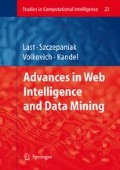Abstract
Users of web search systems often have difficulty determining the relevance of search results to their information needs. Clustering has been suggested as a method for making this task easier. However, this introduces new challenges such as naming the clusters, selecting multiple clusters, and re-sorting the search results based on the cluster information. To address these challenges, we have developed Concept Highlighter, a tool for visually exploring concept-based fuzzy clusters in web search results. This tool automatically generates a set of concepts related to the users’ queries, and performs single-pass fuzzy c-means clustering on the search results using these concepts as the cluster centroids. A visual interface is provided for interactively exploring the search results. In this paper, we describe the features of Concept Highlighter and its use in finding relevant documents within the search results through concept selection and document surrogate highlighting.
Access this chapter
Tax calculation will be finalised at checkout
Purchases are for personal use only
Preview
Unable to display preview. Download preview PDF.
References
ACM. ACM computing classification system. http://www.acm.org/class/.
James C. Bezdek. Pattern Recognition with Fuzzy Objective Function Algorithms. Plenum Press, New York, 1981.
Cynthia A. Brewer. www.colorbrewer.org, 2005.
Douglass Cutting, David Karger, Jan Pedersend, and John Tukey. Scatter/gather: A cluster-based approach to browsing large document collections. In Proceedings of the A CM SIGIR. Conference on Research and Development in Information Retrieval, 1992.
G. W. Furnas, T. K. Landauer, L. M. Gomez, and S. T. Dumais. The vocabulary problem in human-system communication. Communications of the ACM, 30(11), 1987.
Google. Google web API. www.google.com/apis/, 2005.
Grokker. http://www.grokker.com/.
Marti Hearst and Jan Pedersen. Reexamining the cluster hypothesis: Scatter/gather on retrieval results. In Proceedings of the ACM SIGIR. Conference on Research and Development in Information Retrieval, 1996.
Orland Hoeber, Xue-Dong Yang, and Yiyu Yao. Conceptual query expansion. In Proceedings of the Atlantic Web Intelligence Conference, 2005.
Orland Hoeber, Xue-Dong Yang, and Yiyu Yao. Visualization support for interactive query refinement. In Proceedings of the IEEE/WIC/ACM International Conference on Web Intelligence, 2005.
A.K. Jain, M.N. Murty, and P.J. Flynn. Data clustering: A review. ACM Computing Surveys, 31(3), September 1999.
Martin Porter. An algorithm for suffix stripping. Program, 14(3), 1980.
S. E. Robertson and K. Sparck Jones. Simple proven approaches to text retrieval. Technical Report TR356, Cambridge University Computer Laboratory, 1997.
Craig Silverstein, Monika Henzinger, Hannes Marais, and Michael Moricz. Analysis of a very large web search engine query log. SIGIR Forum, 33(1), 1999.
Amanda Spink, Dietmar Wolfram, B. J. Jansen, and Tefko Saracevic. Searching the web: the public and their queries. Journal of the American Society for Information Science and Technology, 52(3), 2001.
Edward Tufte. Envisioning Information. Graphics Press, 1990.
Vivisimo. http://www.vivisimo.com/.
Colin Ware. Information Visualization: Perception for Design. Morgan Kaufmann, 2004.
Yiyu Yao. Information retrieval support systems. In Proceedings of the 2002 IEEE World Congress on Computational Intelligence, 2002.
Oren Zamir and Oren Etzioni. Web document clustering: A feasibility demonstration. In Proceedings of the ACM SIGIR. Conference on Research and Development in Information Retrieval, 1998.
Oren Zamir and Oren Etzioni. Grouper: A dynamic clustering interface to web search results. In Proceedings of the Eighth International World Wide Web Conference, 1999.
Author information
Authors and Affiliations
Editor information
Editors and Affiliations
Rights and permissions
Copyright information
© 2006 Springer-Verlag Berlin Heidelberg
About this chapter
Cite this chapter
Hoeber, O., Yang, XD. (2006). Visually Exploring Concept-Based Fuzzy Clusters in Web Search Results. In: Last, M., Szczepaniak, P.S., Volkovich, Z., Kandel, A. (eds) Advances in Web Intelligence and Data Mining. Studies in Computational Intelligence, vol 23. Springer, Berlin, Heidelberg. https://doi.org/10.1007/3-540-33880-2_9
Download citation
DOI: https://doi.org/10.1007/3-540-33880-2_9
Publisher Name: Springer, Berlin, Heidelberg
Print ISBN: 978-3-540-33879-6
Online ISBN: 978-3-540-33880-2
eBook Packages: EngineeringEngineering (R0)

